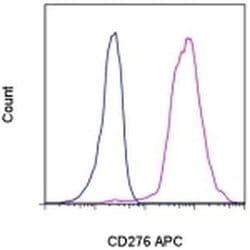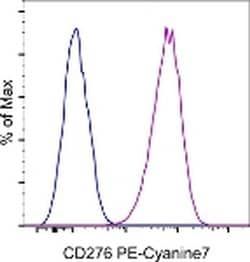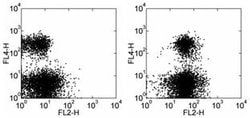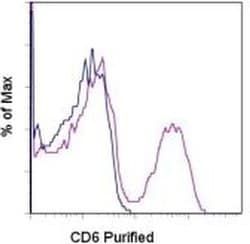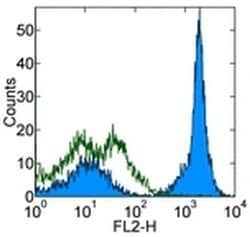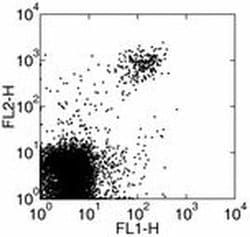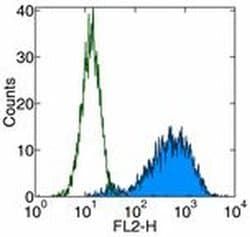16-593-738
CD276 (B7-H3) Monoclonal Antibody (MIH35), Functional Grade, eBioscience™, Invitrogen™
Manufacturer: Invitrogen
Select a Size
| Pack Size | SKU | Availability | Price |
|---|---|---|---|
| Each of 1 | 16-593-738-Each-of-1 | In Stock | ₹ 2,54,540.00 |
16-593-738 - Each of 1
In Stock
Quantity
1
Base Price: ₹ 2,54,540.00
GST (18%): ₹ 45,817.20
Total Price: ₹ 3,00,357.20
Antigen
CD276 (B7-H3)
Classification
Monoclonal
Concentration
1 mg/mL
Formulation
PBS with no preservative; pH 7.2
Gene Accession No.
Q5ZPR3, Q8VE98
Gene Symbols
CD276
Purification Method
Affinity chromatography
Regulatory Status
RUO
Gene ID (Entrez)
102657, 80381
Content And Storage
4° C
Form
Liquid
Applications
Flow Cytometry, Functional Assay
Clone
MIH35
Conjugate
Functional Grade
Gene
CD276
Gene Alias
4Ig-B7-H3; 6030411F23Rik; AU016588; B7 homolog 3; B7h3; B7-H3; B7RP-2; CD276; CD276 antigen; CD276 molecule; CD276 molecule tv1; costimulatory molecule; PSEC0249; sB7 H3; sB7H3; sCD276; soluble B7 H3; soluble B7H3; soluble CD276; UNQ309/PRO352
Host Species
Rat
Quantity
5 mg
Primary or Secondary
Primary
Target Species
Human, Mouse
Product Type
Antibody
Isotype
IgG2a κ
Description
- This monoclonal antibody reacts with mouse and human CD276 (also known as B7-H3), a type I transmembrane protein belonging to the B7 family of costimulatory proteins
- B7-H3 is expressed weakly on activated lymphocytes, macrophages, dendritic cells, nasal and airway epithelial cells, osteoblasts, and some tumor cell lines
- A soluble form of B7-H3 is also secreted by monocytes, dendritic cells, and activated T cells
- Although the biological role of this molecule remains controversial, recent studies have identified B7-H3 as the ligand for TREM-like 2 (TLT-2)
- Applications Reported: This MIH35 antibody has been reported for use in functional assays and flow cytometric analysis
- Applications Tested: This MIH35 antibody has been tested for blocking activity in mouse, as well as by flow cytometric analysis on transfected cell lines
- This can be used at 1 μg per test
- A test is defined as the amount (μg) of antibody that will stain a cell sample in a final volume of 100 μL
- Cell number should be determined empirically but can range from 10^5 to 10^8 cells/test
- It is recommended that the antibody be carefully titrated for optimal performance in the assay of interest
- Storage and handling: Use in a sterile environment
- Filtration: 0.2 μm post-manufacturing filtered
- Purity: Greater than 90%, as determined by SDS-PAGE
- Endotoxin Level: Less than 0.001 ng/ μg antibody, as determined by LAL assay
- Aggregation: Less than 10%, as determined by HPLC
- CD276 is a member of the B7 family of co-stimulatory molecules also known as B7-H3
- CD276 is a type I transmembrane protein that induces the proliferation of CD4+ and CD8+ T cells, enhances the generation of cytotoxic T cells and selectively stimulates the production of interferon gamma
- Expression of CD276 can be induced on dendritic cells and monocytes by inflammatory cytokines, and is also widely expressed in peripheral tissues including the heart, kidney, testis and colon
- In humans, CD276 exists as two isoforms which result from gene duplication and differential splicing
- CD276 is reported to have therapeutic potential for the regulation of cell-mediated immune responses to cancer, particularly in conjunction with anti-angiogenic therapy.
Compare Similar Items
Show Difference
Antigen: CD276 (B7-H3)
Classification: Monoclonal
Concentration: 1 mg/mL
Formulation: PBS with no preservative; pH 7.2
Gene Accession No.: Q5ZPR3, Q8VE98
Gene Symbols: CD276
Purification Method: Affinity chromatography
Regulatory Status: RUO
Gene ID (Entrez): 102657, 80381
Content And Storage: 4° C
Form: Liquid
Applications: Flow Cytometry, Functional Assay
Clone: MIH35
Conjugate: Functional Grade
Gene: CD276
Gene Alias: 4Ig-B7-H3; 6030411F23Rik; AU016588; B7 homolog 3; B7h3; B7-H3; B7RP-2; CD276; CD276 antigen; CD276 molecule; CD276 molecule tv1; costimulatory molecule; PSEC0249; sB7 H3; sB7H3; sCD276; soluble B7 H3; soluble B7H3; soluble CD276; UNQ309/PRO352
Host Species: Rat
Quantity: 5 mg
Primary or Secondary: Primary
Target Species: Human, Mouse
Product Type: Antibody
Isotype: IgG2a κ
Antigen:
CD276 (B7-H3)
Classification:
Monoclonal
Concentration:
1 mg/mL
Formulation:
PBS with no preservative; pH 7.2
Gene Accession No.:
Q5ZPR3, Q8VE98
Gene Symbols:
CD276
Purification Method:
Affinity chromatography
Regulatory Status:
RUO
Gene ID (Entrez):
102657, 80381
Content And Storage:
4° C
Form:
Liquid
Applications:
Flow Cytometry, Functional Assay
Clone:
MIH35
Conjugate:
Functional Grade
Gene:
CD276
Gene Alias:
4Ig-B7-H3; 6030411F23Rik; AU016588; B7 homolog 3; B7h3; B7-H3; B7RP-2; CD276; CD276 antigen; CD276 molecule; CD276 molecule tv1; costimulatory molecule; PSEC0249; sB7 H3; sB7H3; sCD276; soluble B7 H3; soluble B7H3; soluble CD276; UNQ309/PRO352
Host Species:
Rat
Quantity:
5 mg
Primary or Secondary:
Primary
Target Species:
Human, Mouse
Product Type:
Antibody
Isotype:
IgG2a κ
Antigen: CD276 (B7-H3)
Classification: Monoclonal
Concentration: 1 mg/mL
Formulation: PBS with no preservative; pH 7.2
Gene Accession No.: Q5ZPR3, Q8VE98
Gene Symbols: CD276
Purification Method: Affinity chromatography
Regulatory Status: RUO
Gene ID (Entrez): 102657, 80381
Content And Storage: 4° C
Form: Liquid
Applications: Flow Cytometry, Functional Assay
Clone: MIH35
Conjugate: Functional Grade
Gene: CD276
Gene Alias: 4Ig-B7-H3; 6030411F23Rik; AU016588; B7 homolog 3; B7h3; B7-H3; B7RP-2; CD276; CD276 antigen; CD276 molecule; CD276 molecule tv1; costimulatory molecule; PSEC0249; sB7 H3; sB7H3; sCD276; soluble B7 H3; soluble B7H3; soluble CD276; UNQ309/PRO352
Host Species: Rat
Quantity: 500 μg
Primary or Secondary: Primary
Target Species: Human, Mouse
Product Type: Antibody
Isotype: IgG2a κ
Antigen:
CD276 (B7-H3)
Classification:
Monoclonal
Concentration:
1 mg/mL
Formulation:
PBS with no preservative; pH 7.2
Gene Accession No.:
Q5ZPR3, Q8VE98
Gene Symbols:
CD276
Purification Method:
Affinity chromatography
Regulatory Status:
RUO
Gene ID (Entrez):
102657, 80381
Content And Storage:
4° C
Form:
Liquid
Applications:
Flow Cytometry, Functional Assay
Clone:
MIH35
Conjugate:
Functional Grade
Gene:
CD276
Gene Alias:
4Ig-B7-H3; 6030411F23Rik; AU016588; B7 homolog 3; B7h3; B7-H3; B7RP-2; CD276; CD276 antigen; CD276 molecule; CD276 molecule tv1; costimulatory molecule; PSEC0249; sB7 H3; sB7H3; sCD276; soluble B7 H3; soluble B7H3; soluble CD276; UNQ309/PRO352
Host Species:
Rat
Quantity:
500 μg
Primary or Secondary:
Primary
Target Species:
Human, Mouse
Product Type:
Antibody
Isotype:
IgG2a κ
Antigen: NK1.1
Classification: Monoclonal
Concentration: 1 mg/mL
Formulation: PBS with no preservative; pH 7.2
Gene Accession No.: P27812, P27814
Gene Symbols: Klrb1b, Klrb1c
Purification Method: Affinity chromatography
Regulatory Status: RUO
Gene ID (Entrez): 17059, 80782
Content And Storage: 4° C
Form: Liquid
Applications: Flow Cytometry, Functional Assay
Clone: PK136
Conjugate: Functional Grade
Gene: Klrb1b
Gene Alias: AI462337; CD161; CD161 antigen-like family member B; CD161 antigen-like family member C; CD161b; CD161c; EMBL:AAQ11375.1}; Inhibitory receptor NKR-P1B; killer cell lectin-like receptor subfamily A member 1C; killer cell lectin-like receptor subfamily B member 1B; killer cell lectin-like receptor subfamily B member 1B allele A; Killer cell lectin-like receptor subfamily B member 1B allele B; killer cell lectin-like receptor subfamily B member 1B allele C; killer cell lectin-like receptor subfamily B member 1C; killer cell lectin-like receptor subfamily B member 1D; killer cell lectin-like receptor subfamily B member 1F; KLRB1; Klrb1b; klrb1b {ECO:0000312; Klrb1c; Klrb1d; Klrb1f; klrb1f {ECO:0000250; Ly55; Ly-55; Ly55b; ly-55b; Ly55c; ly-55c; Ly55d; Ly-55d; Ly59; Ly-59; lymphocyte antigen 55 complex, locus B; lymphocyte antigen 55 complex, locus C; lymphocyte antigen 55 complex, locus D; lymphocyte antigen 55b; lymphocyte antigen 55c; Lymphocyte antigen 55d; lymphocyte antigen 59; MGC163
Host Species: Mouse
Quantity: 5 mg
Primary or Secondary: Primary
Target Species: Mouse
Product Type: Antibody
Isotype: IgG2a κ
Antigen:
NK1.1
Classification:
Monoclonal
Concentration:
1 mg/mL
Formulation:
PBS with no preservative; pH 7.2
Gene Accession No.:
P27812, P27814
Gene Symbols:
Klrb1b, Klrb1c
Purification Method:
Affinity chromatography
Regulatory Status:
RUO
Gene ID (Entrez):
17059, 80782
Content And Storage:
4° C
Form:
Liquid
Applications:
Flow Cytometry, Functional Assay
Clone:
PK136
Conjugate:
Functional Grade
Gene:
Klrb1b
Gene Alias:
AI462337; CD161; CD161 antigen-like family member B; CD161 antigen-like family member C; CD161b; CD161c; EMBL:AAQ11375.1}; Inhibitory receptor NKR-P1B; killer cell lectin-like receptor subfamily A member 1C; killer cell lectin-like receptor subfamily B member 1B; killer cell lectin-like receptor subfamily B member 1B allele A; Killer cell lectin-like receptor subfamily B member 1B allele B; killer cell lectin-like receptor subfamily B member 1B allele C; killer cell lectin-like receptor subfamily B member 1C; killer cell lectin-like receptor subfamily B member 1D; killer cell lectin-like receptor subfamily B member 1F; KLRB1; Klrb1b; klrb1b {ECO:0000312; Klrb1c; Klrb1d; Klrb1f; klrb1f {ECO:0000250; Ly55; Ly-55; Ly55b; ly-55b; Ly55c; ly-55c; Ly55d; Ly-55d; Ly59; Ly-59; lymphocyte antigen 55 complex, locus B; lymphocyte antigen 55 complex, locus C; lymphocyte antigen 55 complex, locus D; lymphocyte antigen 55b; lymphocyte antigen 55c; Lymphocyte antigen 55d; lymphocyte antigen 59; MGC163
Host Species:
Mouse
Quantity:
5 mg
Primary or Secondary:
Primary
Target Species:
Mouse
Product Type:
Antibody
Isotype:
IgG2a κ
Antigen: CD253 (TRAIL)
Classification: Monoclonal
Concentration: 1 mg/mL
Formulation: PBS with no preservative; pH 7.2
Gene Accession No.: P50592
Gene Symbols: TNFSF10
Purification Method: Affinity chromatography
Regulatory Status: RUO
Gene ID (Entrez): 22035
Content And Storage: 4° C
Form: Liquid
Applications: Flow Cytometry, Functional Assay, Neutralization
Clone: N2B2
Conjugate: Functional Grade
Gene: TNFSF10
Gene Alias: A330042I21Rik; AI448571; Apo-2 ligand; APO2L; Apo-2L; CD253; CD253 antigen; chemokine tumor necrosis factor ligand superfamily member 10; Ly81; Protein TRAIL; TL2; TN; TNF superfamily member 10; TNF-related apoptosis inducing ligand; TNF-related apoptosis inducing ligand TRAIL; TNF-related apoptosis-inducing ligand; Tnfsf10; TNLG6A; TRAIL; TRAIL protein; TRAIL/APO2L; tumor necrosis factor (ligand) family, member 10; tumor necrosis factor (ligand) superfamily member 10; tumor necrosis factor (ligand) superfamily, member 10; tumor necrosis factor apoptosis-inducing ligand splice variant delta; tumor necrosis factor ligand 6A; tumor necrosis factor ligand superfamily member 10; tumor necrosis factor superfamily member 10
Host Species: Rat
Quantity: 25 mg
Primary or Secondary: Primary
Target Species: Mouse
Product Type: Antibody
Isotype: IgG2a κ
Antigen:
CD253 (TRAIL)
Classification:
Monoclonal
Concentration:
1 mg/mL
Formulation:
PBS with no preservative; pH 7.2
Gene Accession No.:
P50592
Gene Symbols:
TNFSF10
Purification Method:
Affinity chromatography
Regulatory Status:
RUO
Gene ID (Entrez):
22035
Content And Storage:
4° C
Form:
Liquid
Applications:
Flow Cytometry, Functional Assay, Neutralization
Clone:
N2B2
Conjugate:
Functional Grade
Gene:
TNFSF10
Gene Alias:
A330042I21Rik; AI448571; Apo-2 ligand; APO2L; Apo-2L; CD253; CD253 antigen; chemokine tumor necrosis factor ligand superfamily member 10; Ly81; Protein TRAIL; TL2; TN; TNF superfamily member 10; TNF-related apoptosis inducing ligand; TNF-related apoptosis inducing ligand TRAIL; TNF-related apoptosis-inducing ligand; Tnfsf10; TNLG6A; TRAIL; TRAIL protein; TRAIL/APO2L; tumor necrosis factor (ligand) family, member 10; tumor necrosis factor (ligand) superfamily member 10; tumor necrosis factor (ligand) superfamily, member 10; tumor necrosis factor apoptosis-inducing ligand splice variant delta; tumor necrosis factor ligand 6A; tumor necrosis factor ligand superfamily member 10; tumor necrosis factor superfamily member 10
Host Species:
Rat
Quantity:
25 mg
Primary or Secondary:
Primary
Target Species:
Mouse
Product Type:
Antibody
Isotype:
IgG2a κ

